The controversial roll-out of smart meters for consumers has the potential to be the “next universal credit” if it is poorly managed, Labour MP Caroline Flint has warned.
Speaking at today’s Energy UK Annual Conference, the former energy shadow secretary was drawn into a debate about the efficacy of price caps to protect consumers.
Michael Lewis, chief executive at E.On UK, was adamant that rather than placing limits on the amount suppliers can charge consumers for their energy consumption, it was instead a matter of improving engagement with them and demonstrating the range of tariffs available.
Lewis continued by adding that smart meters would be pivotal to this engagement, however Flint jumped on their mention by insisting that the roll-out programme could be regarded as the next universal credit considering poor public awareness of both their use and benefits.
The Conservative government’s universal credit reforms, which promised to roll in a variety of welfare payments into one, have been resoundingly criticised for their faltering roll-out, various delays and other issues which have left claimants confused and out of pocket.
Flint drew parallels between the issues affecting universal credit and a smart meter roll-out programme which has so far flattered to deceive.
Having stood by its intention for every household to be offered a smart meter by 2020, both the government and energy regulator Ofgem have placed pressure on energy suppliers to pick up the pace at which meters are being deployed.
However consumer confidence and understanding of them remains low. The Department for Business, Energy and Industrial Strategy’s most recent public attitudes tracker survey found that 56% of its sample did not have a smart meter installed, while a further 18% had never heard of them.
Furthermore, just 20% of those surveyed said they looked at in-home energy displays or monitors on a daily basis.
The smart meter programme has too been dogged by high-profile setbacks. Earlier this year it was revealed that discrepancies between SMETS1 and SMETS2 software meant that a fifth of smart meters installed in homes would prohibit switching suppliers, a matter which caught the ire of Labour MPs in the House of Commons.
Then energy minister Jesse Norman defended the roll-out, insisting that it needed to be judged based on its “long term benefits” rather than its recent misgivings before adding that it stood to save consumers £46 billion by the end of the decade.






